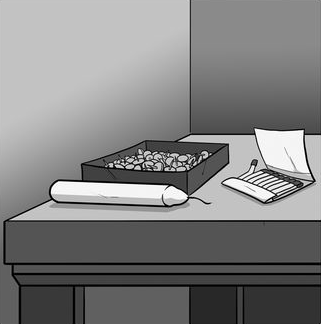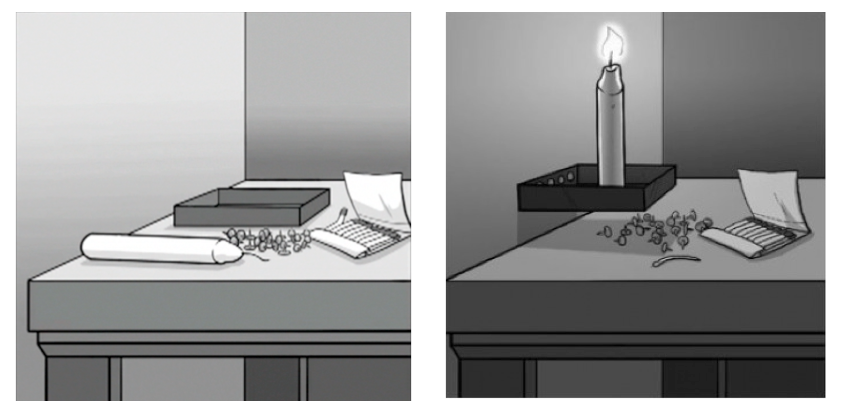All through the history, the typical motivational approach is as short term as "carrot to rabbit" ot "bone to dog". All we have to suggest now is that this typical approach works only for mechanical tasks and in fact this short term motivational approach works against us for cognitive tasks.
Gestalt psychologist Karl Duncker is credited for devising candle problem in 1945. The assignment was to fix and light a candle on a wall (a cork board) in a way so the candle wax won't drip onto the table.
In a further experiment, it was found that when rewards were arranged for such cognitive intensive problems, participants with option of rewards came up with solution 3.5 minutes longer than the participants who were in control group(without any offering of rewards). This clearly shows that rewards clearly overburden your mind and leads to bad performance.
The same experiment as shown below with simpler and straight forward goal resulted in faster execution. This now clearly suggests that only with mechanical and simple task do such rewards work.
Somewhat similar results were achieved by Dan Ariely in India where offering more rewards at top for the more cognitive tasks resulted in worst performance. Though, the point to be noticed is that people who performed with least or medium or no rewards were equal in performance.Here is the link for the study.
http://danariely.com/2008/11/20/what%E2%80%99s-the-value-of-a-big-bonus/
So what should be the way ahead. According to Dan Ariely, motivation is not just about money. It is more about
1) evoking competition,
2) evoking a feeling of achievement or feeling of creation,
3) evoking a feeling of conquering,
4) feeling meaningful,
5) acknowledging and
6) give an option to pursue a goal.
The above list is picked from:
https://www.youtube.com/watch?v=wfcro5iM5vw
To add to this there are 3 other important factors :
1) Autonomy - The urge to direct own life (Utilized in gamification by providing options in games)
2) Mastery - To become better and better at something
3) Purpose - Yearning to do a piece of work which is part of larger than we do individually
An Australian company Atlasian gives opportunity to employees to do 20% of time autonomously now. This is on par with google and thus, providing Autonomy hs helped them to improve their products amazingly.
Content from : https://www.youtube.com/watch?v=rrkrvAUbU9Y
To add to this, one must find what makes one happy. Now, what makes one happy is subjective and personal. But, one thing is sure that such work should subsume and immerse one person in the activity itself. This has been talked as effortless FLOW by famous psychologist "Mihaly Czikszentmihalyi". But, this may take a long time as long as 10 years in physical or mental training.
https://www.youtube.com/watch?v=fXIeFJCqsPs
Important Takeaways:
1) Carrots and Sticks will remain inferior to Autonomy, Mastery, and Purpose.
2) Follow your intrinsic motivation.
3) Go for something which leads you to ecstatic state on regular basis.
Gestalt psychologist Karl Duncker is credited for devising candle problem in 1945. The assignment was to fix and light a candle on a wall (a cork board) in a way so the candle wax won't drip onto the table.
In a further experiment, it was found that when rewards were arranged for such cognitive intensive problems, participants with option of rewards came up with solution 3.5 minutes longer than the participants who were in control group(without any offering of rewards). This clearly shows that rewards clearly overburden your mind and leads to bad performance.
The same experiment as shown below with simpler and straight forward goal resulted in faster execution. This now clearly suggests that only with mechanical and simple task do such rewards work.
Somewhat similar results were achieved by Dan Ariely in India where offering more rewards at top for the more cognitive tasks resulted in worst performance. Though, the point to be noticed is that people who performed with least or medium or no rewards were equal in performance.Here is the link for the study.
http://danariely.com/2008/11/20/what%E2%80%99s-the-value-of-a-big-bonus/
So what should be the way ahead. According to Dan Ariely, motivation is not just about money. It is more about
1) evoking competition,
2) evoking a feeling of achievement or feeling of creation,
3) evoking a feeling of conquering,
4) feeling meaningful,
5) acknowledging and
6) give an option to pursue a goal.
The above list is picked from:
https://www.youtube.com/watch?v=wfcro5iM5vw
V Nice Concluding Excerpt from the talk: If you think about Adam Smith versus Karl Marx, Adam Smith had the very important notion of efficiency. He gave an example of a pin factory. He said pins have 12 different steps,and if one person does all 12 steps, production is very low. But if you get one person to do step one and one person to do step two and step three and so on, production can increase tremendously. And indeed, this is a great example and the reason for the Industrial Revolution and efficiency. Karl Marx, on the other hand, said that the alienation of labor is incredibly important in how people think about the connection to what they are doing. And if you make all 12 steps, you care about the pin. But if you make one step every time, maybe you don't care as much.
And I think that in the Industrial Revolution, Adam Smith was more correct than Karl Marx, but the reality is that we've switched and now we're in the knowledge economy. And you can ask yourself, what happens in a knowledge economy? Is efficiency still more important than meaning? I think the answer is no. I think that as we move to situations in which people have to decide on their own about how much effort, attention, caring, how connected they feel to it, are they thinking about labor on the way to work and in the shower and so on, all of a sudden Marx has more things to say to us. So when we think about labor, we usually think about motivation and payment as the same thing, but the reality is that we should probably add all kinds of things to it -- meaning, creation, challenges, ownership, identity, pride, etc. And the good news is that if we added all of those components and thought about them, how do we create our own meaning, pride, motivation, and how do we do it in our workplace and for the employees, I think we could get people to both be more productive and happier.
After this revelation of Dan Ariely, there is theory of intrinsic motivators, because they matter more. And I think that in the Industrial Revolution, Adam Smith was more correct than Karl Marx, but the reality is that we've switched and now we're in the knowledge economy. And you can ask yourself, what happens in a knowledge economy? Is efficiency still more important than meaning? I think the answer is no. I think that as we move to situations in which people have to decide on their own about how much effort, attention, caring, how connected they feel to it, are they thinking about labor on the way to work and in the shower and so on, all of a sudden Marx has more things to say to us. So when we think about labor, we usually think about motivation and payment as the same thing, but the reality is that we should probably add all kinds of things to it -- meaning, creation, challenges, ownership, identity, pride, etc. And the good news is that if we added all of those components and thought about them, how do we create our own meaning, pride, motivation, and how do we do it in our workplace and for the employees, I think we could get people to both be more productive and happier.
To add to this there are 3 other important factors :
1) Autonomy - The urge to direct own life (Utilized in gamification by providing options in games)
2) Mastery - To become better and better at something
3) Purpose - Yearning to do a piece of work which is part of larger than we do individually
An Australian company Atlasian gives opportunity to employees to do 20% of time autonomously now. This is on par with google and thus, providing Autonomy hs helped them to improve their products amazingly.
Content from : https://www.youtube.com/watch?v=rrkrvAUbU9Y
To add to this, one must find what makes one happy. Now, what makes one happy is subjective and personal. But, one thing is sure that such work should subsume and immerse one person in the activity itself. This has been talked as effortless FLOW by famous psychologist "Mihaly Czikszentmihalyi". But, this may take a long time as long as 10 years in physical or mental training.
https://www.youtube.com/watch?v=fXIeFJCqsPs
Important Takeaways:
1) Carrots and Sticks will remain inferior to Autonomy, Mastery, and Purpose.
2) Follow your intrinsic motivation.
3) Go for something which leads you to ecstatic state on regular basis.



